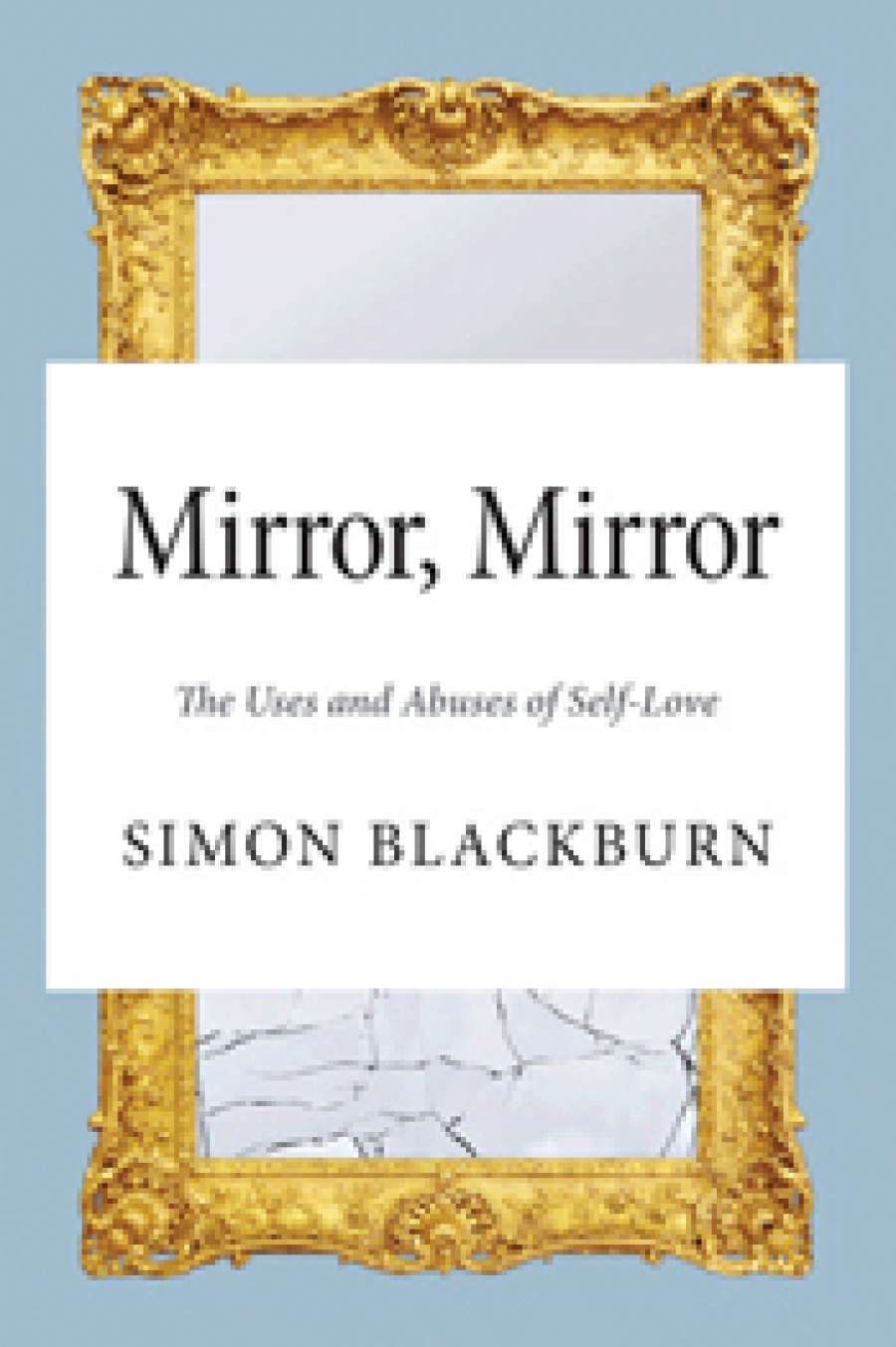
- Free Article: No
- Contents Category: Philosophy
- Review Article: Yes
- Article Title: Are you worth it?
- Online Only: No
- Custom Highlight Text:
Everyone knows the emotions of self-concern – self-esteem, pride, vanity, self-respect – and associated character traits – authenticity, arrogance, humility, and the like. Yet as soon as we start to think seriously about them and the roles they play in personal and social life, they tantalise with their ambiguities and their resistance to easy definition. Some forms of self-concern, such as arrogance and hubris, are disagreeable. Yet others, such as self-respect, seem desirable. Why? And what is self-respect exactly, anyway? How much do these various emotions and dispositions contribute to (or detract from) a good or decent life?
- Book 1 Title: Mirror, Mirror
- Book 1 Subtitle: The uses and abuses of self-love
- Book 1 Biblio: Princeton University Press (Footprint) $42.95 pb, 213 pp, 9780691161426
- Book 1 Readings Link: booktopia.kh4ffx.net/Zd57O1
There is much to enjoy in Simon Blackburn’s erudite and sometimes amusing discussions of these fascinating topics, through which he meanders. (His own word is ‘perambulation’.) It is an easygoing and undemanding book. There is no pretence of thoroughness, and the contentions are not closely argued. Some readers will enjoy (as I did) the exploration of various myths, such as Narcissus, and the Myth of the Fall, though whether they actually cast much light on narcissism or pride is another question.
Blackburn is a fine philosopher and has contributed a great deal to the academic discipline. He is also that most valuable philosopher, an academic who has written intelligible, interesting, and penetrating philosophy for the general public. It is disappointing, then, to find that Mirror, Mirror, while interesting and accessible, is not very penetrating. This is not to demand the standards of rigour, precision, and thoroughness expected in a scholarly academic work. It is just to say that the general reader is best served by a bit more rigour, precision, and thoroughness than she often gets. Indeed, philosophy is best served if these virtues are on display.
Blackburn illustrates his discussion by reference not just to myths, but to contemporary phenomena, about some of which he holds strong views. Mirror, Mirror, as well as being an urbane reflection on the self-regarding emotions, is a polemic. Blackburn targets what he sees as various prevalent evils that are rooted especially in vanity, hubris, and narcissism. He is appalled at the advertising line used by the cosmetics giant L’Oréal, ‘Because you’re worth it’. (This reviewer’s distaste for the line is there all right, but falls rather short of Blackburn’s ‘inchoate despair’.) He is appalled as well at ‘the generation that over the years has so shamelessly implemented the idea that greed is good, that there is no such thing as society, that, because they are worth it, their predations on the common good give them no more than their due’. He believes that many political leaders (with George W. Bush and Tony Blair specifically mentioned) have so much hubris (‘demented self-confidence’) that, in words he quotes from David Owen, it ‘could legitimately be deemed to constitute a medically recognised syndrome’.
It is rather admirable to have philosophy driven by serious passion. Nonetheless, Blackburn’s sweeping and rather extravagant condemnations needed more evidence. From such a good philosopher it is disappointing not to have more concentrated and organised reasoning. Indeed, some of Blackburn’s judgements on vanity in connection with the L’Oréal advertisement seemed to me unfair and even offensive to both the models in the advertisements and the purchasers of cosmetics. Harsh words about the image projected by the models (‘self-absorption’, ‘arrogance’, ‘disdain’) turn to harsh words about the women projecting it (‘Their vanity and indifference goes with being above us all …’).
Customers fare no better. The idea seems to be that the advertising slogan is an appeal to vanity and that vanity drives the purchases. What then is vanity? Blackburn ignores the conventional understanding, that it is an excessive estimate of, or concern about, one’s qualities, especially one’s appearance. Instead, he proposes that there are two basic types of vanity. One is disdain, or indifference to the activities or attitudes of those one considers inferior to oneself. The other is an excessive desire for the envy of others (a seriously excessive desire, in fact: ‘a gripping, caustic, obsessive desire – an aching need …’). Is either of these vanity? Well, possibly the term is sometimes used on these ways, though I doubt it. But disagreements about terminology matter much less than the question: what sort of vanity, if any, is being appealed to by the L’Oréal slogan, and what sort of vanity, if any, is being manifested by the buyers of the cosmetics? Doubtless some purchasers are vain, in one or other of the meanings of the word. But surely the vast majority are not. We are given no evidence that the concern for appearance implicit in buying cosmetics is in itself excessive, and certainly no evidence for the proposition, profoundly insulting to the people concerned, that the majority have a caustic, obsessive desire for the envy of others.
Obviously much advertising, not just for cosmetics, attempts to appeal to people’s concerns about how they present to others (think of advertisements for watches and cars). Is this an appeal to vanity? Vanity defined how? Is it an appeal to some other form of self-concern? If so, is it an objectionable sort of self-concern? Whatever its shortcomings, Mirror, Mirror prompts thought both on these difficult, wider questions, and on matters important to our personal lives. Besides, it is fun. Read it, but read it critically.


Comments powered by CComment